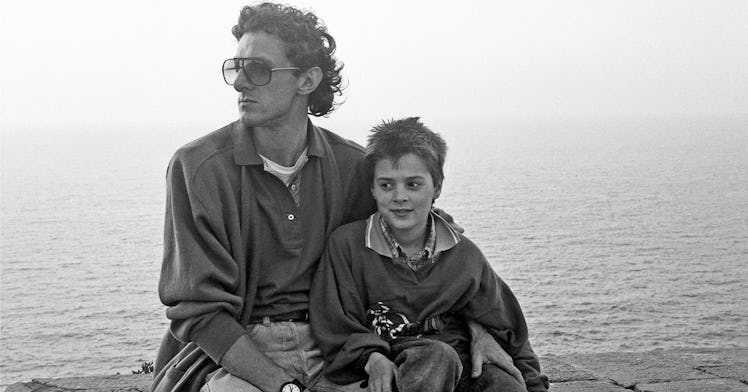All Men Need a Therapist, But Especially Dads
Therapist Lori Gottlieb makes a very convincing case as to why men need to get their ass on a therapist's couch, especially if they're a dad.

Therapists are at once highly empathetic and completely inscrutable. They are feeling Sphinxes. In part because you’re forking over immense sums of money for their connection, one can’t help but wonder what they really think of you. Is their concert genuine?
In her new book Maybe You Should To Someone, Gottlieb, a sought-after psychotherapist with decades of experience and who pens The Atlantic‘s “Dear Therapist” column, breaks the omerta of the therapeutic class. (Yes, they judge.) But more importantly, she lifts the curtain on what was, for me, an immensely surprising fact, that therapists too are people. Now as for why that is so surprising? Well, maybe I should talk to someone.
We caught up with Gottlieb recently on the Fatherly podcast where she, among other things, made a very convincing case as to why men need to get their ass on a therapist’s couch, especially if they’re a dad.
Note: This interview is an edited version of the Fatherly podcast.
Although more and more men are going to therapy, it’s still true many tend to have a real block about it. In your practice, have you noticed that men and women approach the couch differently?
Often when men come to see me, they’ll say things like, “I’ve never told anybody this before” or that I’m the first person who’s hearing it. They haven’t told their partner or their friends and family members. Women will usually say something like, “I was just telling my mom the other day,” or “As I was just talking to my best friend about this…” Women tend to feel they have more permission to talk about their experiences whereas men, who often don’t know how what they say will be received, tend to keep it to themselves.
Yes, but talking to a therapist seems much different than talking to a friend, right?
Another person won’t help them to see things the same way that a therapist does. A friend’s job is to back you up. Whereas a therapist will really help you see the situation from a more macro perspective. What are you doing? What is the other person doing? What’s going on relationally with you what’s going on emotionally with you? So it’s a different experience. That said, a lot of men struggle with the feeling that they are the only ones experiencing what they’re feeling. They don’t know how universal their experiences are, even if the specifics are unique. That can lead to a lot of shame and isolation.
For me, becoming a Dad was a thunderclap to get the mental help I need, especially now that my kids are older and I see how some of my patterns and traits are manifest in them. As a therapist, how does the dynamic change for you when a patient becomes a parent?
Kids will hold up a mirror to you in a way that that no one else will. There’s a great paper called Ghosts in the Nursery that I highly recommend that really talks about how we carry our own childhoods with us into the way that we parent. As a therapist and the mother to a 13-year-old son, I really get it when people are talking about their struggles. I really get the experience of wanting to do right by your kid. There’s so much judgment out in the world around whether people are doing things “right.” Everybody’s got an opinion and parents need to learn to trust and to understand themselves .
One thing that’s very instructive is just the idea of hearing the inner dialogue of someone in your position. For a lot of people in therapy for a long time, there’s that element of mystery, like what is my therapist really were thinking…
By showing myself in therapy at the same time that I was providing therapy in the book I wanted to show that as a patient I react very similarly to the way that my patients react to me. I want my therapist to like me. When I see someone in the waiting room when I’m leaving him like, I thought does he look forward to her sessions more? I’m curious about the other patients. It’s a very one-sided relationship. I know a lot about these people’s lives and they don’t know a lot about mine. On the other hand, it’s not one-sided at all. It’s one of the most intimate emotional relationships a person can have. There’s such an incredible human connection happening that really only happens in that space.